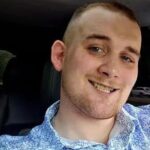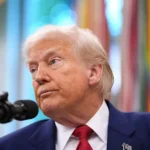In a shocking act of violence that has sent shockwaves through Colombia, 39-year-old Miguel Uribe Turbay, a prominent senator and presidential candidate, remains in critical condition after being shot at a campaign event in the capital, Bogotá, on Saturday, June 7, 2025. The attack occurred while Uribe was addressing his supporters in a park, and left the entire nation in disbelief and fear.
Uribe, a member of the right-wing Centro Democratico party, was shot multiple times, with two of the bullets striking him in the head. The shooting has sparked widespread condemnation from both national and international figures, with the act being seen as not just an attack on a political figure, but an assault on democracy itself. The entire political landscape of Colombia has been shaken by this violent incident, particularly given the growing tensions in the country as Uribe was preparing to contest next year’s presidential election.
According to initial reports from the Colombian authorities, the shooting took place around 9:00 p.m. on Saturday evening, during one of Uribe’s campaign speeches in a park located in the city’s 137th Street and California Street area. As Uribe addressed his audience, the peaceful scene was violently interrupted when a lone gunman, later identified as a 15-year-old male, opened fire from close range, striking Uribe twice in the head.
The assailant was quickly apprehended at the scene by police officers who were present for security, and the suspect was arrested. The police also reported that the young attacker, who was carrying a “9mm Glock-type firearm,” was wounded in the leg during the arrest. He was taken into custody and is currently being questioned by authorities. Despite the arrest, the motive behind the attack remains unclear, and investigators are still trying to understand the reasons behind the violent assault.
Following the attack, Uribe, who is a vocal critic of Colombia’s left-wing government under President Gustavo Petro, was rushed to the Santa Fe Foundation Hospital. Once there, he underwent emergency surgery to address the severe injuries to his head and thigh. His condition remained critical in the days following the attack, with hospital officials confirming that Uribe was placed into intensive care, where he was closely monitored by medical professionals.
Uribe’s wife, Maria Claudia Tarazona, issued an emotional statement urging the nation to pray for his survival. “Miguel is currently fighting for his life. Let us ask God to guide the hands of the doctors who are treating him,” Tarazona wrote, as she expressed her hopes for his recovery.
Uribe’s friends, family, colleagues, and political supporters have all expressed shock and sorrow over the attack. A leading figure in the political opposition, Uribe has built his political career through his outspoken criticism of President Petro’s policies, including his controversial tax reform bill. Despite the ongoing tensions, Uribe’s supporters and even members of the opposition have rallied around him, urging the nation to unite in support of Uribe’s recovery and in defense of democratic values.
The shooting of such a high-profile political figure has reignited memories of Colombia’s violent past. For decades, the country has struggled with political violence, particularly during the era of drug cartels and paramilitary groups. The assassination of political figures was common, with infamous events like the murder of Diana Turbay, Uribe’s mother, who was a journalist kidnapped by the Medellín Cartel in 1991. Her tragic death, after a failed rescue attempt, highlighted the dangers faced by those who stood against the powerful criminal organizations in Colombia.
In a statement following the attack, Bogotá Mayor Carlos Fernando Galán called the event a direct blow to the country’s political stability, urging that Colombia must never return to a time of political violence. “We cannot return to situations of political violence, nor to times when violence was used to eliminate those who thought differently,” Galán remarked, emphasizing the need for peaceful political dialogue in the country.
The government of President Gustavo Petro swiftly condemned the attack as an assault on democracy. Petro, who had been elected on promises of peace and social reform, expressed his shock and called for unity during this challenging time. Despite political differences, Petro urged Colombians to focus on supporting Uribe’s recovery. In a video address, the President acknowledged the political divide between his government and Uribe but stressed that “what matters most today is that all Colombians focus with the energy of our hearts, with our will to live, on ensuring that Dr. Miguel Uribe stays alive.”
Despite the tension between Uribe and the left-wing government, there was a recognition from many in the political sphere that the attack was a dangerous escalation of political hostilities. The right-wing opposition, including Uribe’s party, Centro Democratico, condemned the attack, labeling it a direct threat to democracy and freedom in Colombia. The party emphasized that violence, regardless of its origin, has no place in the country’s political discourse.
The attack also comes at a time of heightened political tension in Colombia. In the weeks leading up to the shooting, there was growing friction between the government and opposition parties, particularly regarding President Petro’s reforms and Uribe’s criticism of those measures. Uribe’s condemnation of Petro’s policies, especially the tax reform law, had ignited public debates, and many feared that tensions between the political factions were reaching a boiling point. This tragic event has amplified those concerns and highlighted the volatility of the political climate in the country.
In the aftermath of the attack, there have been widespread calls for increased security at political events and rallies, particularly those involving high-profile figures like Uribe. The authorities have promised to conduct a thorough investigation into the shooting and have vowed to ensure that the perpetrators, if there are more than just the 15-year-old suspect, are held accountable for their actions.
A reward of 3 billion pesos (approximately $730,000) has been offered for information leading to the identification of any additional individuals responsible for the attack. The Colombian Defense Minister Pedro Sanchez also expressed his outrage, labeling the attack a “vile act” and committing to a thorough investigation.
The U.S. government has also weighed in on the incident. Secretary of State Marco Rubio condemned the shooting as a “direct threat to democracy” in Colombia, calling it an unacceptable act of violence. Rubio linked the attack to the “violent rhetoric” from the Colombian government, though many in Colombia have been critical of such comments, citing that violence can come from all sides of the political spectrum.
As the country grapples with the consequences of this violence, there are fears that the attack on Uribe may lead to further divisions and unrest. Uribe’s supporters and family remain hopeful that he will recover, but the events of June 7th have cast a dark shadow over Colombia’s political future. The coming weeks will be crucial in determining the course of action the government will take to prevent such violence from occurring again and whether the country will be able to restore calm amidst the political chaos.
For now, the people of Colombia are holding their breath, hoping for a miracle that will see Uribe return to the political scene and continue his leadership role. His survival is not just a personal victory, but a victory for the ideals of democracy, freedom, and justice. The country watches closely as the investigation unfolds, and as the political landscape continues to shift in the wake of this horrific attack.




